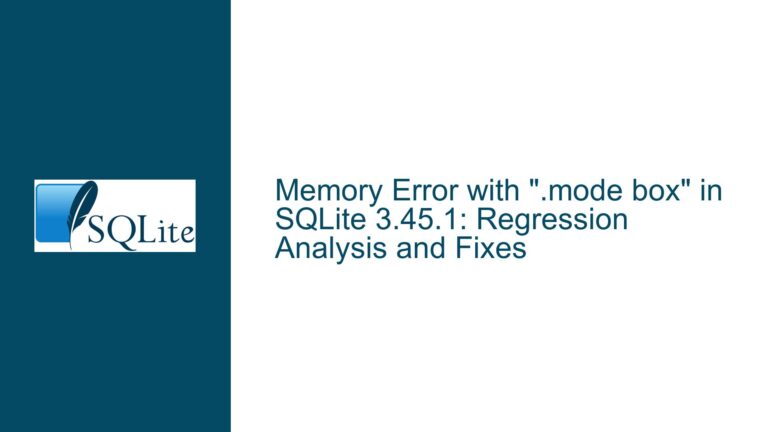SQLite PPC64 Pointer Size Misconfiguration on Darwin Platforms
Misconfigured Pointer Size Definition in SQLite for Darwin PPC64
The issue at hand revolves around a misconfiguration in SQLite’s source code that incorrectly defines the pointer size for Darwin PPC64 architectures. Specifically, the code erroneously uses the __POWERPC__ macro to determine the pointer size, which is defined for both 32-bit (ppc) and 64-bit (ppc64) PowerPC architectures. This leads to an incorrect assumption that the pointer size is 4 bytes (32-bit) on PPC64 systems, which is not the case. The correct macro to use for distinguishing between 32-bit and 64-bit PowerPC architectures on Darwin platforms is __ppc__ for 32-bit and __ppc64__ for 64-bit.
The misconfiguration is present in two files: sqlite3.c and tea/generic/tclsqlite3.c. In both files, the SQLITE_PTRSIZE macro is defined based on a series of architecture checks. The problematic line in both files is:
(defined(__APPLE__) && defined(__POWERPC__))
This line incorrectly assumes that __POWERPC__ is sufficient to determine the pointer size, which is not true for PPC64 systems. The correct line should be:
(defined(__APPLE__) && defined(__ppc__))
This ensures that only 32-bit PowerPC architectures are assigned a 4-byte pointer size, while 64-bit architectures (PPC64) are correctly handled elsewhere in the code.
Additionally, the issue extends to the config.guess file, where the __POWERPC__ macro is used to detect PowerPC architectures. The line:
if (echo '#ifdef __POWERPC__'; echo IS_PPC; echo '#endif') | \
should be replaced with:
if (echo '#ifdef __ppc__'; echo IS_PPC; echo '#endif') | \
to ensure accurate detection of 32-bit PowerPC architectures.
Impact of Incorrect Pointer Size Definition on PPC64 Systems
The incorrect definition of SQLITE_PTRSIZE on PPC64 systems can lead to several critical issues. First, it causes SQLite to assume a 4-byte pointer size on 64-bit systems, which can result in memory corruption, crashes, or undefined behavior when SQLite attempts to allocate or manipulate memory using the wrong pointer size. This is particularly problematic for applications that rely on SQLite for data storage and retrieval, as it can lead to data corruption or loss.
Second, the misconfiguration can cause compatibility issues with other software components that expect SQLite to correctly handle 64-bit pointers. For example, if SQLite is used as a backend for a larger application that assumes 64-bit pointers, the application may fail to function correctly or exhibit unpredictable behavior.
Third, the issue can complicate debugging and troubleshooting efforts, as the symptoms of the problem may not be immediately obvious. Developers may spend significant time investigating memory-related issues or crashes without realizing that the root cause lies in the incorrect pointer size definition.
Resolving the Pointer Size Misconfiguration in SQLite
To resolve the issue, the following steps should be taken:
Update the
SQLITE_PTRSIZEDefinition insqlite3.candtclsqlite3.c:
TheSQLITE_PTRSIZEmacro should be updated to use the correct macro for 32-bit PowerPC architectures. Specifically, the line:(defined(__APPLE__) && defined(__POWERPC__))should be replaced with:
(defined(__APPLE__) && defined(__ppc__))This ensures that only 32-bit PowerPC architectures are assigned a 4-byte pointer size, while 64-bit architectures are correctly handled elsewhere in the code.
Update the
config.guessFile:
Theconfig.guessfile should be updated to use the correct macro for detecting 32-bit PowerPC architectures. Specifically, the line:if (echo '#ifdef __POWERPC__'; echo IS_PPC; echo '#endif') | \should be replaced with:
if (echo '#ifdef __ppc__'; echo IS_PPC; echo '#endif') | \This ensures that the correct architecture is detected during the build process.
Verify the Fix:
After applying the changes, the SQLite build should be tested on both 32-bit and 64-bit PowerPC architectures to ensure that the pointer size is correctly defined and that there are no regressions or compatibility issues.Incorporate the Fix into Future Releases:
The fix should be incorporated into future releases of SQLite to prevent the issue from affecting other users. This includes ensuring that the fix is included in both major and minor releases, as appropriate.Document the Change:
The change should be documented in the SQLite release notes and any relevant documentation to inform users of the fix and its implications. This helps users understand the issue and take appropriate action if they are affected.
By following these steps, the misconfiguration in SQLite’s pointer size definition for Darwin PPC64 architectures can be resolved, ensuring correct behavior and compatibility on both 32-bit and 64-bit systems.






